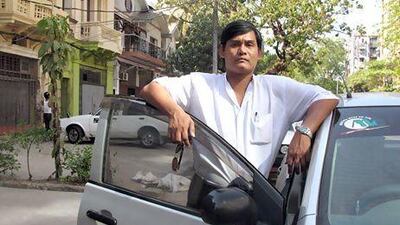YANGON // Taxi drivers are often a font of local knowledge, but few offer as stark a vision of recent history as the former political prisoners who operate Myanmar's Golden Harp taxi company.
Take a ride through Yangon with Bo Bo, Talky or Shell, the three founders of Golden Harp, who still use their prison nicknames, and you get a disturbing but vital insight into the brutal military regime that still holds powerful sway over the country.
"I was put in prison in 1991 for joining a march in support of Aung San Suu Kyi when she won her Nobel prize," said Bo Bo, 42, as he drove through the congested streets of the city's downtown district. "I spent the next eight years in prison."
During that time, the former technology student was locked in a tiny square cell with at least three other prisoners for more than 23 hours a day, fed on rock-hard grains of rice and denied basic medical care.
He narrowly escaped another spell in Myanmar's jails after taking part in the 2007 Saffron Revolution that was crushed by the military junta. "My friends were arrested so I hid. I spent a year going house to house until I made it across the border to Thailand."
He returned last year after democratic reforms by the new, quasi-civilian government of President Thein Sein.
Activists estimate that there are 8,000 former political prisoners living in Myanmar today. Hundreds have been released since the reforms began in 2011, but they receive no help in re-adjusting to civilian life. Many have suffered mental and physical trauma. Others have missed out on education and training, and until recently, were shunned by society.
"When I was released from prison the first time, people were afraid to talk to me in case they got in trouble," said Bo Bo. "The intelligence guys were always following me. No companies wanted to hire a former prisoner."
The repressive atmosphere has eased, but finding work after years on the run was a challenge. With the help of the Assistance Association for Political Prisoners (AAPP), an organisation based in Thailand run by former political prisoners that led the campaign to get prisoners released, Bo Bo and his friends came up with the taxi scheme and raised a small amount of deposit money for the first three cars.
Since then, the group has expanded to five and they are setting aside money to bring in a dozen more former inmates by the end of the year.
The AAPP has also established a team of counsellors in Yangon and Mandalay to help former prisoners, with support from experts at Johns Hopkins University in the United States.
"This is just the start - we want to keep expanding and starting new projects," said Bo Kyi, joint secretary of AAPP. "My dream is to open a hotel and tourist company staffed completely by former prisoners, but we need a lot of starting money."
Despite the amnesties, the AAPP says there are still 400 political prisoners locked up around Myanmar. For the first time, the government has set up a committee of military, police and prison officials to examine the issue, and invited the AAPP to take part.
"At the moment, the government doesn't recognise the concept of political prisoners. That is the first thing we need to address," said Bo Kyi, a former prisoner who spent over 13 years in exile before returning in January.
"But we want to go further and make the government take responsibility for the suffering it has caused to these people's lives. Many were tortured and raped, especially in ethnic areas. Many are desperate for money but have been denied education and training."
He remains sceptical about the committee's prospects. Conflicts in ethnic areas and heavy-handed responses to democratic protests mean arbitrary arrests and convictions continue.
"They set up this committee because of pressure from the international community," he said. "But the judiciary is still not independent here. There needs to be a whole change of mindset to see that civil society is not their enemy. We need to work together to rehabilitate this society."
foreign.desk@thenational.ae

